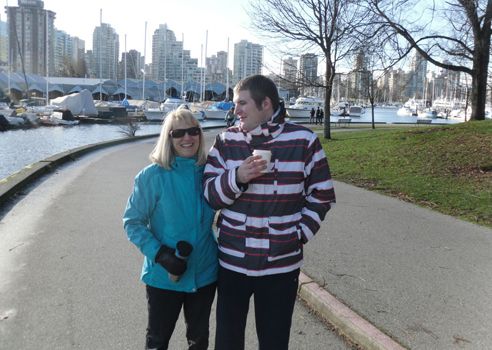Reading time: Less than 2 minutes
Do your teeth hurt? Imagine what it would be like to have severe dental pain that persisted for years and no hope of treatment…
I’m seldom able to be public about crisis communications in which I’m involved. My column today is the happy exception.
No harm will come from publicizing the project, which aims to provide proper dental care to BC adults with developmental disabilities, such as autism, down syndrome and cerebral palsy.
I’m involved because my friend, retired lawyer Joan Rush, is chairing the campaign. Her motivation? Basic human rights. Joan has a 28-year old son, Graeme, with severe autism. (That’s a photo of both of them, above.) Graeme does not speak, read or write. And, like many people with autism, he cannot have regular dentist appointments. He needs a general anesthetic, even for teeth cleaning. As a child, he had excellent care from the local Children’s Hospital. But as soon as he’d “aged out” of the system, things began to fall apart.
Graeme started beating his own face about nine years ago. His family immediately suspected dental problems, but dentists dismissed them saying they couldn’t get operating room time. Then he started having seizures from pain, but dentists still wouldn’t respond to the problem. Doctors remained puzzled. When Joan finally threatened to sue, Graeme got his dental appointment and, under anesthetic, they discovered he needed five root canals. (Having suffered through a root canal myself and being in severe pain for a matter of days, I cannot imagine the pain Graeme suffered for years.)
Now Joan is on a mission to see BC dentists properly trained in treating adults with developmental disabilities. Shockingly, they receive no such training in their current curriculum. She would like to see a treatment facility built at the University of B.C. that can not only educate new dentists but also provide timely treatment for those who need it.
The sad truth is that most people with developmental disabilities not only can’t advocate for themselves — they’re also poor. Joan recognizes that — as a lawyer — she has the good fortune to be able to argue for a much needed social change.
I know my blog has readers around the world and perhaps many of you aren’t affected by what happens in British Columbia, where I live. I urge you to look in your own communities and see how people with developmental disabilities are treated. I think you will be surprised, perhaps even shocked.
If you live in BC and have any interest in this issue, you can read a report that Joan wrote for the BC Law Foundation, called Help! Teeth Hurt.

